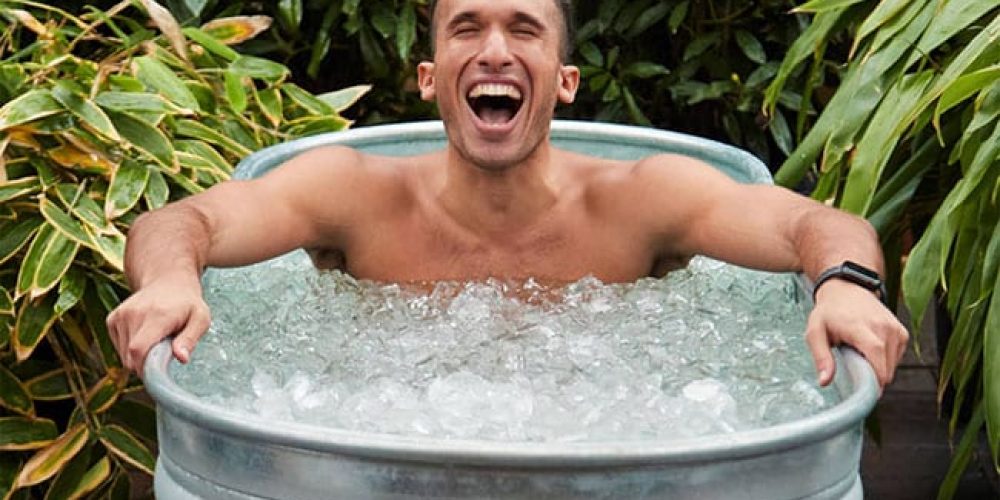Ice baths or “cold water immersions” (CWI) are not new, but they have become popular in recent years. As the name suggests, they involve submerging the body in a bath of icy cold water for a short period of time.
Ice Bath In Sports
In sports therapy, an ice bath, or sometimes cold-water immersion or cold therapy, is a training regimen usually following a period of intense exercises like cardio or HIIT. In ice baths, a substantial part of the human body is immersed in ice water for a limited duration.
While it is becoming increasingly popular and accepted among athletes in various sports, the method is controversial. It involves a risk of hypothermia, with the possibility of shock leading to sudden death. Many athletes use cold water immersion after an intense exercise workout, believing it speeds up physical recovery.

You can better understand the ice bath controversy through our blog, “Cold Or Hot Shower For Workout Recovery”.
What Happens To Your Body With Ice Baths
With ice baths, you constrict your blood vessels in the blood flow to the area where you have ice or cold applied. So if it’s your entire body, you’re going to get constriction of those blood vessels throughout your body, focusing on your legs and arms away from your core where most of your heat is held.
Ice Bath Benefits
If you’re considering trying an ice bath, you might wonder what the potential benefits are and if it’s worth subjecting your body to the extreme cold. The good news is there are some potential benefits of using an ice bath, especially for people who work out or are competitive athletes.
Reduce Pain And Inflammation
It can numb pain receptors and bring down inflammation, so you can almost think of it as a drug-free anesthetic. Patients who have inflammatory conditions like rheumatoid arthritis may find that cold water immersion helps reduce swelling or discomfort from flare-ups or after workouts.
Lowers Body Temperature
Not surprisingly, ice baths can cool your body down very fast. In some cases, this can be lifesaving. Ice baths are used in medicine to treat things like heat stroke, and it's common to have tubs filled with ice on the sidelines of marathons.
Better Sleep
Cold water immersion may also help you feel more relaxed after a challenging workout. Some people note that it helps them actually sleep better, so after getting really hot, really sweaty, and doing an ice bath, they just feel rested.
Improves Focus
Another benefit of ice baths is that they help with focus. People sometimes do this as almost a post-workout meditation, which helps them focus on recovery and slow their heart rate.
How To Take Ice Baths
There is a right way to take ice baths to stay safe. Before you unload the freezer, here are a few guidelines from experts to follow:
- Since the ice and your body will increase the water volume, fill water halfway up the side of the tub.
- Use cold water because your ice may melt too quickly if your water is too warm.
- Add three 5 lb. Bags of ice to the water to chill it to 55 to 60 °F. Depending on your convenience, you can use store-bought ice or ice from your freezer.
- Before your bath, take a short, lukewarm shower to soap up so you'll be clean when you get in the tub.
- Put on shorts and foot booties to protect sensitive areas.
- If you are only soaking the lower half of your body, you might even wear a sweatshirt in the bath, so your upper body stays warm.
- Give yourself time to adjust to the cold by slowly entering the water.
- Dip your upper body into the water if desired when you're ready.
- Set a timer for 5-10 minutes, and try to stay in your bath until the timer goes off.
You can take ice baths at your home, but advisably you should perform it under the supervision of a qualified trainer. Fineyourgym.ae can help you find such gyms offering ice baths. Just click the link gym near me.
Risks Associated with Ice Baths
Decreased Blood Flow
The decrease in core temperature and the immersion in ice constricts blood vessels which slow the flow of blood in the body. It may place you at risk for cardiac arrest or stroke.
Feeling Very Cold
An ice bath's most noticeable side effect is feeling very cold when you immerse your body in the cold water.
Hypothermia
Another risk is hypothermia, especially if you’re submerged in the ice bath for too long.
Who Should Avoid Ice Baths?
Ice baths are not recommended for everyone. There are medical conditions where you should check with your doctor beforehand because ice baths can have adverse and potentially dangerous effects. These conditions include heart disease, high blood pressure, diabetes, peripheral neuropathy, poor circulation, venous stasis, and cold agglutinin disease.
Related Article:

Cold Or Hot Shower For Workout Recovery
Cold Or Hot Shower for Workout Recovery is One of the hottest topics among gym enthusiasts and most asked question.









Comments 0